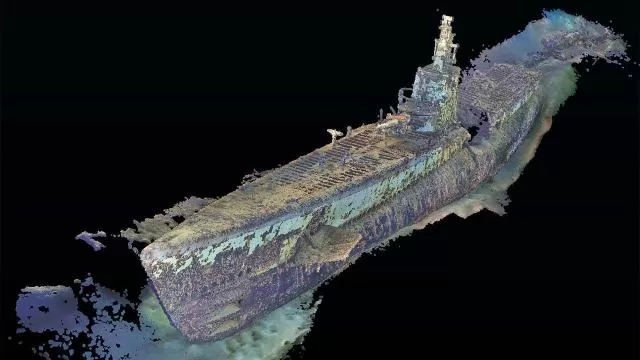The wreck of a U.S. Navy submarine that “sank the most Japanese warships” during World War II has been found in the South China Sea after being missing for nearly 80 years.
The USS Harder, which vanished on Aug. 24, 1944, with 79 sailors onboard, has been discovered off Luzon island in the Philippines with the help of data provided by Tim Taylor, CEO of Tiburon Subsea and the Lost 52 Project, according to the Naval History and Heritage Command (NHHC).
“We are grateful that Lost 52 has given us the opportunity to once again honor the valor of the crew of the ‘Hit ‘em HARDER’ submarine that sank the most Japanese warships — in particularly audacious attacks — under her legendary skipper, Cmdr. Sam Dealey,” NHHC Director Samuel J. Cox, a retired U.S. Navy rear admiral, said in a statement.
The agency says the wreckage of the USS Harder is “resting at a depth of more than 3,000 feet” and “sits upright on her keel relatively intact except for the depth-charge damage aft of the conning tower.”
Taylor told Fox News Digital that the process to find the USS Harder involved “archival research and applying multiple autonomous robots to cover vast swaths of the search efficiently.”
The submarine, which was commissioned in December 1942, made six war patrols before its sinking. In its fifth patrol, described by the NHHC as its “most successful,” it targeted Japanese destroyers “by sinking three of them and heavily damaging or destroying two others in four days.”
During its final patrol, the submarine attacked and destroyed three escort ships off the Philippines province of Baatan, with the help of fellow submarine USS Haddo.
“Japanese records later revealed Harder fired three torpedoes at CD-22,” another escort ship in the area, on Aug. 24, 1944, according to the NHHC.
The Japanese ship evaded the torpedoes and began a series of depth charge attacks,” it added, with the “fifth depth charge attack sinking Harder and her crew.”
Following its service in World War II, the USS Harder received the Presidential Unit Citation and six battle stars, the NHHC says.
Source: Fox News











